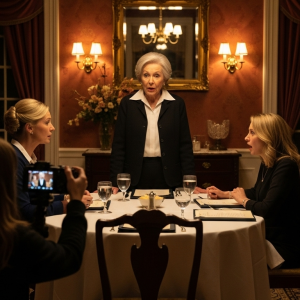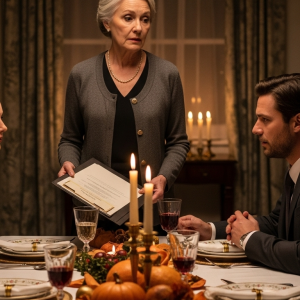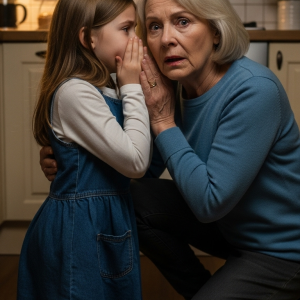Before I tell you how everything unraveled, you need to know this: there is nothing more painful than giving everything you have and still being told it’s not enough. The deepest wounds often come from the people you raised, the ones who once held your hand as children and now barely look you in the eye.
I was only trying to help. In the process, I lost everything. But walking away was the best thing I ever did, and I’m going to tell you why.
It was early March in Ohio, cold enough to see your breath but not cold enough to hide from the world. I was in the garden when the phone rang. It was my son, Brian. His voice was too careful. “Hey, Mom. How are you doing?”
I hadn’t heard from him in three weeks. Since his marriage to Tiffany, our calls had become polite, distant formalities. I told him I was fine, a small lie to cover the cavern of loneliness that had opened since my husband, Harold, passed.
“You’ve been alone for a while now,” he said. “I don’t like the idea of you rattling around that big house by yourself.” Then came the pause, the one that tells you the next words have been rehearsed. “Tiffany and I were talking… We think maybe you should come live with us for a while.”
My heart stuttered. The last time I visited, Tiffany barely spoke two words to me. She was a whirlwind of busyness and phone screens. But the thought of being near my grandchildren, of hearing laughter in the house again, was a powerful lure. I ignored the unease in my gut and, a week later, I packed a suitcase. I drove to their house with a cautious hope that I would later learn was dangerously naive.
No one came out to greet me. Tiffany opened the door, her face a mask of strained neutrality. “You’re early,” she said, stepping aside into a home that smelled of takeout and diapers. Brian gave me a quick, distracted hug, the baby balanced on his hip.
He pointed to the guest room. “We cleared it out for you.”
It wasn’t cleared out. It was a storage room with an air mattress on the floor. There were boxes everywhere, a broken lamp in the corner, and no space for my things. Still, I smiled. “It’ll do,” I said, the words tasting like surrender.
That first night, listening to the unfamiliar sounds of their house, I felt a creeping dread. I had walked into something that had nothing to do with my loneliness and everything to do with their need. I just didn’t know what it was yet.
The days that followed were a masterclass in subtle dismissals. I tried to be helpful—cooking, cleaning, watching the boys—but every effort was met with Tiffany’s quiet irritation or Brian’s weary absence. He was always working late or pacing the kitchen on tense phone calls. “We’re just stretched thin, Mom,” he’d say, the exhaustion plain on his face.
The micro-aggressions from Tiffany started to pile up. A sigh when I used the washing machine. A sharp comment about the electric bill. Then, the financial requests began.
“I know it’s a little awkward,” Brian began one night over dinner, avoiding my eyes. “But things are tight. If you could maybe help with the mortgage, just until we get caught up…”
Of course, I said. I dipped into my savings, the money Harold and I had carefully set aside for my old age. I thought it was a one-time thing. But the next month, he asked again. And the next. It became an expectation, my contribution the silent price of admission into their lives.
I began to see things I had previously ignored: Brian’s phone buzzing late at night, Tiffany’s expensive shopping bags despite her constant complaints about money. The tension in the house was a suffocating, invisible fog.
I felt like I was becoming a ghost in their home—a useful ghost, who could provide childcare and pay bills, but a ghost nonetheless. I was a wallet, a babysitter, and a maid. And yet I stayed, because I loved them, and I still believed I could fix whatever was broken.
The moment that shattered the illusion came on a Thursday. I was exhausted after a day of managing tantrums and cleaning up messes. I made a chicken casserole, hoping a familiar comfort meal might bring a moment of peace.
Tiffany sat across from me, scrolling on her phone. Brian ate in silence, his laptop propped open beside his plate. Trying to bridge the silence, I said gently, “You know, if we all sat together more often for meals, maybe the boys would eat better.”
Tiffany’s head snapped up. Her voice was flat, but laced with venom. “You’re always making little comments, Maggie, like we don’t know how to run our own house.”
“I didn’t mean it like that,” I stammered. “I just…”
She cut me off, her fork clattering onto her plate. “You do a lot of talking for someone who doesn’t actually contribute enough to be making suggestions.”
The words hung in the air, sucking all the oxygen from the room. Doesn’t contribute enough. After paying half their mortgage, cooking their meals, cleaning their house, and loving their children. Brian said nothing. He just stared at his plate, a portrait of cowardice.
In that instant, I saw everything with blinding clarity. I wasn’t family. I was a resource they were draining dry. I stood up, rinsed my plate in silence, and walked to my room. My heart hammered against my ribs, a frantic bird trapped in a cage.
That night, sleep never came. By morning, something inside me had hardened. The woman who made excuses, who absorbed pain to keep the peace, was gone. I zipped my suitcase, walked to the kitchen, and left a one-line note on the counter: Thank you for having me.

I walked out the front door just after sunrise. No one stopped me. As I drove away, the road blurring through my tears, I knew I wasn’t just leaving their house. I was leaving behind the person I had been for my entire life—the woman who believed her love could fix anything.
Back in my own quiet, dusty house, the first thing I did was open my banking app. I found the automatic transfers to Brian and Tiffany’s account. Click. Cancel. Click. Cancel. The finality of it felt like taking my first breath after being held underwater.
A week later, I was still wrestling with the silence when a strange pit formed in my stomach. Something told me to check my old bank statements, to dig deeper. I didn’t know what I was looking for, but I found it.
It wasn’t just the mortgage payments. There were dozens of other charges, withdrawals made by Brian, for a company I didn’t recognize. I Googled the name. It was an online gambling site.
The screen blurred. Hundreds of dollars at a time, sometimes multiple times a week, all while I was under their roof, listening to them talk about how tight things were. He hadn’t just used me. He had actively deceived me, funneling my love and my life savings into an addiction he was hiding.
The resentment that bloomed in my chest was a cold, unfamiliar thing. The next morning, I woke up changed. I opened a new bank account. I changed the locks on my front door. It was a ritual, sealing the space between the woman I used to be and the woman I was becoming.
The calls from Brian started a week later. First casual, then probing, then laced with panic. “Hey, did the bank call you? Something weird happened with the mortgage.” I let them all go to voicemail.
Then, slowly, the signs of their collapse began to appear online. Tiffany’s curated Instagram feed faltered. The happy family photos stopped. Then came the online listings: a “gently used” sectional sofa—their sofa. Designer handbags. Finally, her SUV was gone from the driveway in the background of a neighbor’s photo.
The final proof arrived in my mailbox, a pre-foreclosure notice forwarded from their address. That night, Brian texted. “I know you’re upset, but Mom, we need help. Just this once. Please.” No apology. No explanation. Just need.
The old me, the mother who equated sacrifice with love, would have rushed in to fix it. But she was gone. Instead, I sat down and wrote a letter, not to them, but to myself. I listed every dollar, every meal, every act of service. And at the bottom, I wrote: And still, it wasn’t enough.
The truth was a verdict. I was finally done trying to earn my worth. They were about to learn what life looked like without me. And I was about to learn what life looked like when I finally chose myself.
I disappeared. Not from my house, but from their lives. I blocked Brian’s number. I signed up for therapy. I pulled my old sewing machine from the attic and started creating again. I opened an online store, selling tote bags and baby blankets. Strangers paid me what my work was worth and sent messages telling me my stitching reminded them of their own grandmothers. For the first time in years, I felt valued, not for what I could give away, but for what I could create.
Then came Christmas Eve. A knock at my door revealed a large box on the porch. Inside were the two iPads I had sent the boys, now decorated with stickers and glitter. A note in a child’s scrawl read: We miss you. Merry Christmas. Come back soon.
I sat on the floor and wept. Not for Brian or Tiffany, but for the children caught in the crossfire. My love for them was a separate thing, a clean and fierce emotion that existed outside their parents’ betrayal. I sent them another box, filled with warm coats, books, and two framed photos of us smiling together.
I also included a card for Brian and Tiffany. On it, I wrote: “Love isn’t a loan. Respect isn’t optional. And help isn’t forever.”
A week later, a box appeared on my porch. Inside were the photo frames, returned. But the coats and books were gone. On the back of the card, in Brian’s handwriting, was a new line: We understand. We’ll figure it out.
The final call came on a Tuesday night. Brian’s voice was raw. “Mom,” he said, “I need to see you.”
When I opened the door the next day, I barely recognized him. He was thin, pale, and stripped of all his former confidence. He sat on the edge of my couch. “I messed up,” he whispered. “I’m addicted to online betting. I ruined everything. The house is behind. Tiffany’s talking about leaving. I don’t know what to do.”
Then came the question I’d been waiting for. “Can you help us? Just this once.”
I looked at my son, the boy I once rocked through fevers, now drowning in the consequences of his own choices. I stood, walked to the front door, and opened it.
“Not today, Brian,” I said, my voice firm but not unkind. “Not until you understand what it cost me to sit in this room alone while you let your wife humiliate me in yours. I gave until I disappeared, and you watched it happen. Now you have to live in the silence you created.”
A single tear slipped down his cheek. “I’m sorry,” he whispered. And for the first time, I believed him. But it wasn’t enough to fix what was broken. He left without another word. That night, I cried, but not for him. I cried for the mother I used to be, the woman who thought love meant endless, unconditional bailouts. She was finally gone.
Three weeks later, Brian was at my door again. He looked different. Tired, but honest. “I started going to meetings,” he said. “Gamblers Anonymous. I got a second job doing deliveries. I’m trying, Mom.”
He looked at me, his eyes raw with fear. “I need help, but this time I’m not just asking for money. I need you to teach me how to be responsible.”
This was the crossroads. I went to my desk and returned with a folder. Inside was a payment agreement, a budget plan, a list of rehab clinics, and a separation checklist.
“My terms,” I said. “I will pay the past-due amount on the mortgage to keep you from foreclosure. One time. That is all. From now on, you will attend every meeting. You will separate your finances completely from Tiffany’s. If you want my guidance, you will earn it. If you slip up once, I’m out.”
He stared at the papers, his hands trembling. Then he looked at me and nodded. “Okay.”
At the door, he turned back. “I never realized how much I leaned on you until you stepped away.”
I allowed myself a faint smile. “That’s the thing about leaning, Brian. It only works until the person holding you up finally decides to stand straight.”
The months that followed were a slow, painful climb for him. But he did it. He worked, he went to his meetings, he learned to manage his money. He and Tiffany separated, and he moved into a small duplex, a place he paid for with his own money.
The last time I saw him, he was standing outside that duplex, holding the keys. He didn’t look like a man who had won; he looked like a man who had survived.
“Mom,” he said, his voice steady and clear. “I did it.”
“I know,” I said, my voice breaking.
“I wouldn’t have done it without you,” he admitted. “But you didn’t save me by giving me money. You saved me by giving me the space to save myself.”
I hugged him, a real hug, free of resentment and obligation. As I watched him walk into his own home, I felt a profound sense of peace. I hadn’t just reclaimed my life; I had given my son the difficult, painful gift of his own. And for the first time, I knew we would both be okay.




